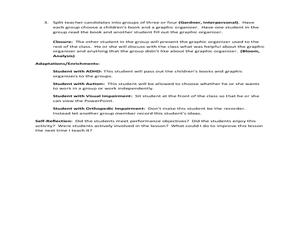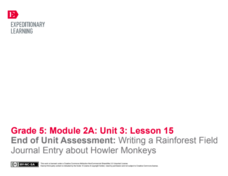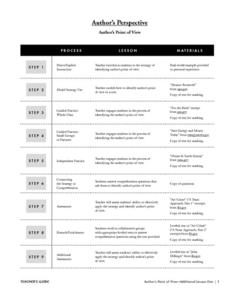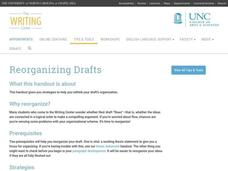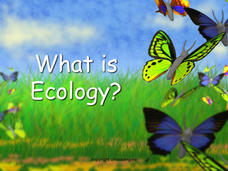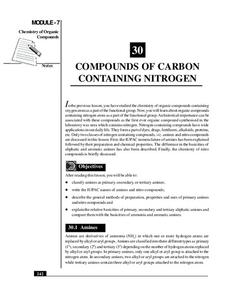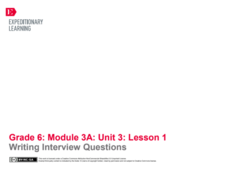Curriculum Corner
Fiction Organizer
Teach your youngsters about the elements of plot with this handy graphic organizer. Pupils note down the main character, the setting, the problem, and the solution of any fictional story they read.
Mission Valley Ambulance
The Crucible
Prepare readers of Arthur Miller's The Crucible for a timed, in-class essay assessment with seven graphic organizers that ask individuals to note conflicts, both internal and external, characters' actions, possible...
Curated OER
Cause and Effect Relationships - Silence of the Bees
Why are bees disappearing? Explore cause and effect relationships with this interesting question. As the detailed lesson plan indicates, start by brainstorming some of the possible effects the disappearance of bees would have on the...
Curated OER
Organizational Structures of Nonfiction Text/Graphic Organizers
Fifth graders review the characteristics of a nonfiction text. In this language arts lesson plan, 5th graders understand that one can use a specific graphic organizer to help them in understanding an organizational structure. For...
Curated OER
Graphic Organizer Lesson
Students investigate how to use graphic organizers. In this literary elements lesson, students are introduced to several types of graphic organizers and their purpose. Students read a book of their choice and complete a graphic organizer...
Curated OER
Supporting Predictions With Text Evidence
Learners practice making and supporting a prediction with proof from a story. In this reading comprehension lesson, students read the book No Roses for Harry and make a prediction about the next event. Learners use evidence from the text...
Curated OER
Picture Clues and Repeated Text
Kids read The Grouchy Ladybug and predict what the outcome will be based on picture clues and repeated text. Next, they draw their predictions. A great way to use both prediction and context clue skills in your kindergarten class.
California Education Partners
Follow the Water by Arthur Dorros
Assess scholars' reading and writing capabilities with an exam that challenges learners to respond to an informative text. Through note-taking and peer discussion, pupils analyze a passage from the story, Follow the Water from Brook to...
Lakeshorelearning
Read and Write about It
Reading informational text is a skill that transcends subjects and grade levels. Practice reading about different topics in various formats with a language arts lesson that includes opportunities for writing and research as well.
EngageNY
End of Unit Assessment: Writing a Rainforest Field Journal Entry about Howler Monkeys
Give me more details. Scholars complete an end of unit assessment by creating an information text box to go with their field journal entries about howler monkeys. Learners use the class time to work independently.
Annenberg Foundation
Global America
It's not really a small world after all! The 21st lesson of a 22-part series on American history researches the impact of globalization on the United States. Using photographic and written references materials, as well as video sources,...
EngageNY
Mid-Unit 3 Assessment: On-Demand Note-Taking about Howler Monkeys
Get the facts straight. Scholars complete their mid-unit assessment by reading a text, watching a video, and observing a picture about howler monkeys. They take notes about the facts they discover to use in future lessons.
DePaul University
Bold Plans, Big Dreams, City Progress
Determining which statements represent fact or the author's opinion in an integral part of reading informational text. Encourage seventh graders to read a passage about Barack Obama and the city of Chicago, as well as a passage focused...
National Institute of Open Schooling
Nomenclature and General Principles
Carbon, the base for all organic compounds, exists in nature in its purest form as graphite or diamonds. The 25th lesson in a series of 36 teaches pupils the nomenclature of organic compounds. Learners read about how to use the IUPAC...
Curriculum Corner
7th Grade ELA Common Core Checklists
Track your class's progress on all of the ELA Common Core standards with these handy charts. Along the left side, each seventh grade identifier is listed along with the full text of the standard. As you teach, reteach, assess,...
Take 10
Author’s Perspective
Gradually build understanding of author's point of view through a scaffolded set of exercises. Moving from direct instruction, to collaborative work, and eventually to independent practice, these steps will assist your class in...
University of North Carolina
Reorganizing Drafts
Poor organization often destroys an otherwise good paper. After writing a first draft, individuals consider the organization of ideas, a topic discussed in the 16th handout in the 24-part Writing the Paper series. The resource covers...
Biology Junction
What Is Ecology?
Do you know the name for the biological study of interactions? A short presentation with accompanying worksheet introduces individuals to ecology. The materials offer a broad overview of the subject and the levels of organization to...
National Institute of Open Schooling
Compounds of Carbon Containing Nitrogen
Amines are vital to humans because they help form amino acids, the building blocks of proteins. The 30th lesson in a series of 36 specifically focuses on the organic compounds that contain nitrogen. Learners classify amines and nitro...
Louisiana Department of Education
Hatchet
Accompany a novel study of Hatchet by Gary Paulson with a unit consisting of 16 lessons focused on physical and emotional survival. Reading the story along with a variety of informational texts, scholars compare and contrast reading...
EngageNY
Writing Interview Questions
And now for the star witness! Scholars take a look at a model newspaper article and discuss the importance of eyewitness accounts. In groups of three, they take turns underlining text from eyewitnesses. They then regroup to talk about...
For the Teachers
Sequence Plot Chart
Your kids can identify the plot sequence of a short story, but what about an informational article? Have them examine the chronological order of events in informational texts with a lesson on the sequence of events.
K12 Reader
Taiga Ecosystems
Introduce your class to another type of ecosystem, the taiga ecosystem, through a reading passage. Class members read the text and then respond to five reading questions about the content of the passage.
Thoughtful Education Press
Compare and Contrast
Encourage readers to compare and contrast the information that they find in informational text with a variety of reading passages and worksheets. Learners read all about subjects in science, social studies, and literature...
Other popular searches
- Organizing Text
- Identify Text Organization
- Text Organization Patterns
- Organizing Text Information
- Types of Text Organization
- Text Organizational Patterns
- Reading Text Organization
- Organizing Text Sequence
- Author Text Organization
- Types Text Organization
- Science Text Organization
- Ways of Organizing Text




